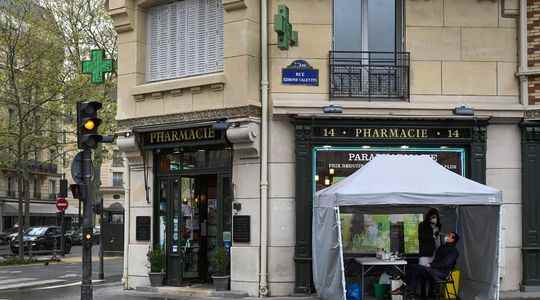Good news on the front of the epidemic. With 59,760 positive cases for the Omicron variant of Covid-19 recorded in 24 hours, the average for the last seven days, which smooths out statistical bumps, has dropped to 66,695 daily contaminations. It exceeded 130,000 in early April.
At the hospital, the number of patients with Covid-19 also fell slightly, to 24,130, according to data from Public Health France, against 24,430 on Wednesday and 25,179 a week ago. The slow decrease continues in particular in critical care services, which had 1,629 Covid patients, against 1,658 on Wednesday and 1,677 seven days ago.
If you can’t read the graph Click here.
Unfortunately, the epidemic continues to kill. The Covid-19 has caused the death of 116 people in 24 hours, bringing the total number of deaths in France to 145,711 in more than two years.
- “Zero Covid”: China does not change course
China said on Friday that it would continue with its zero Covid strategy, a “major asset” against the coronavirus, despite growing frustration in Shanghai where confined residents are now protesting by banging their pans on the windows.
Largely spared for two years, the Asian giant is facing its worst epidemic outbreak since the spring of 2020. The Ministry of Health has again announced more than 15,500 new positive cases in the past 24 hours. In the metropolis of Shanghai (east), by far the most affected and whose 25 million inhabitants have been confined since the beginning of April, the authorities reported Friday 52 additional deaths – all unvaccinated.
The zero Covid strategy consists of various measures: confinement of neighborhoods or cities as soon as cases appear, quarantine of people who test positive, even asymptomatic, or even mass screening. “This is a major asset for preventing and controlling the epidemic” in China, where 1.4 billion people live, Li Bin, a deputy health minister, pleaded to the press on Friday.
“Our country is very populated, with regional imbalances in terms of development and a lack of medical resources. If we relax (measures) and let the virus spread, many people will be infected.”
The zero Covid strategy has made it possible to limit the number of deaths from the disease (officially less than 5,000). But the long confinements weigh on the economy and are badly experienced by the population.
- Italy deactivates the health pass
Italians will no longer need a health pass and will drop the mask from May 1 in nightclubs, bars, restaurants and at the office but will have to keep it on until June 15 in transport and in cinemas , concert or sport according to a decree signed Thursday by the Italian Minister of Health Roberto Speranza. The vaccination obligation will only remain in force for health personnel until December 31.
- South Korea: end of the compulsory mask outside
Wearing a mask outdoors, one of the last health restrictions still in force in South Korea, will cease to be compulsory from Monday, authorities announced on Friday.
The mask will remain mandatory in transportation, indoors in public places as well as when participating in gatherings of more than 50 people outdoors, said Jeong Eun-kyeong, director of the Korea Control and Prevention Agency. diseases.
South Korea had recorded a peak of more than 620,000 cases of Covid-19 per day in mid-March, but contaminations have since been in “regular decrease”, the number of seriously ill patients too, and hospital capacities are sufficient, explained Jeong Eun-kyeon. Over 86% of South Korea’s approximately 51 million people are fully immunized.
